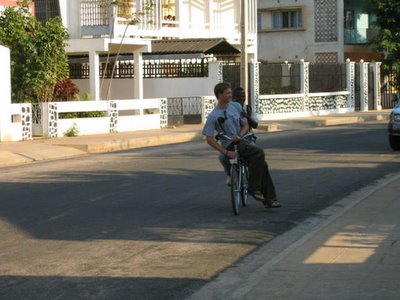Cultural Quirks
Okay, well I’ll be moving to Cuamba at the end of the week here – the day after Thanksgiving, actually. This is the small town where I’ll be living for the remainder of my time here in Mozambique. It’s been great to have these past several months to focus on the language, but I’m definitely excited and ready to get out there and be about the work that I came here to do. Please keep me in your prayers as I’m adjusting once again (I feel like a nomad sometimes…) and making new friendships and partnerships with the people I’ll be living and working around for the next 18 months.
One downside about being over there is that it’s much more remote and I really have no idea how often I’ll be able to update my blog from here on out. As of today, my house doesn’t even have a phone line (hopefully I’ll have one before long); and the nearest internet café will be four hours away in Malawi… When I can get online, I’m sure I’ll be mostly focused on emailing, but I will try my best to post updates here as often as I’m able. So please do continue to check in from time to time…
And to keep your interest for the time being, I’m posting twelve small stories and cultural quirks that I’ve noticed since I’ve been here. You may want to pace yourself, and just read a couple each week so you can feel like I’m still posting new information… And of course, comments are always welcome-
Mata bicu
If you know me very well, you know that breakfast is, hands down, my favorite meal of the day. A friend in Houston once made the statement that I’m not only a big fan of breakfast, but I’m a big fan of a big breakfast. One thing I thought was really cool about Portuguese (or at least Mozambiquan Portuguese) is that the word for breakfast is “matabicu”. It literally means “kill the bug”. As in, "I’ve got to get up and kill the bug that’s inside me and making me hungry". It fits into my ideology very well, so I thought I’d share it.
 Flowers
FlowersI don’t think this is the case for all African countries, but it definitely is for Mozambique. There aren’t many flowers around here. Not much water, and I don’t think I’ve seen a wild flower the whole time I’ve been here… My language tutor and I were talking about cultural things one day and he mentioned that people don’t really like flowers. I asked why, and explained that it’s a nice complement to receive them in the States. He said, “No, no, no. You must never give someone flowers unless you wish to insult them. If you want to complement someone, give them some potatoes or some corn meal.”
He explained to me that flowers have no practical purpose. You can’t eat them, you can’t plant them to grow more and sell them (though nobody would buy them anyway), they’re purely decorational (kind of like throw pillows…?). They view it as an insult because you’re giving them something they can’t use. This is the viewpoint of a Mozambiquan – pretty though it may be, we have no use for it unless it will help us get through the day.
Good Smells, Bad Smells
You know how you can always smell the stinky guy on the bus? Well I’ve come to realize that I’ve always been able to smell the stinky guy because I was used to everyone smelling pretty good in general.
Well over here it’s the opposite. I’ve grown so accustomed to smelling BO and other not-so-pleasant things that I’ve really started noticing whenever someone or something smells nice. Men’s cologne, women’s perfume, air fresheners, candles - anything with a scent. When I meet someone who smells good, I just want to keep hanging out with them. I found myself not wanting to leave a bathroom the other day because it smelled so good…
 Feel Like a Bike Ride?
Feel Like a Bike Ride?Obviously most Mozambiquans don’t own cars, but there are still some pretty massive distances that they need to travel to get from their farms to the markets or to visit family and friends. The transportation of choice for mid-distance travel is the bicycle. You can buy a new bike for around $40-50, which is about a month’s salary for people with a good job. The most usual sight is one guy on a bike (women almost never ride them) with a big load of charcoal, hay, or something else to sell on the back. I’ve seen loads up to probably around 250 pounds on the back of a bike.
The second most common sight is nicely demonstrated in the photo here. If you can’t tell, I’m sitting on the bar that connects the seat to the steering wheel. It’s not the most comfortable ride for the passenger, especially when you’re twice the size of the guy pedaling (that’s Luis, my language tutor, driving – and he’s all of ~4’10”). , but it will get you where you’re going. We were going to visit a friend, and he got all excited to take me there on his bike. We actually fell down in the middle of the street before we got going, because I didn’t know how to sit on it properly – I’d never ridden side-saddle on a bicycle before…
I’ve actually seen up to four people riding on the same bike. One person behind the driver, one on the bar in front, where I was, and sometimes another on the handlebars. I don’t know how they can actually get going, and I always feel sorry for the poor bum doing all the pedaling…
Africa Clean
I know that at least some of you know what “camping clean” means. Basically, there are different levels of cleanliness, and the rules that apply when you’re at home don’t hold when you’re out camping somewhere. For instance, when you’re done eating your dinner at home you might wash the dish out in the sink and let it dry. When you’re camping you might not have any soap, and the only water is from the river, and you can’t let it set there wet, so you dry it with the shirt you’ve been wearing all day. It’s not perfect, but it’s “camping clean”.
Well, here we have a little something called “Africa clean.” It’s the next step beyond “camping clean” and there are two main ways that I see it being different. First, one has to accept that everything at every time will be dirty. As soon as something is cleaned, it becomes dirty merely by being here. There is dust in the air constantly and the smart ones of us (I think) have accepted the inevitable and just stopped cleaning :-)
The second difference is that you need to become one with your surroundings. This doesn’t mean some funky meditation; it means that you accept the fact that your house isn’t just your house. God, in His wisdom, placed all sorts of creeping and crawling things on the planet with us and “Africa clean” means that they’re welcome any time they choose to drop by, without risk of being smashed. Note here that this does NOT apply to cockroaches - that’s a different level of clean that I haven’t reached yet. But small lizards and most insects are accepted as the norm. There are some battles that aren’t worth fighting, and keeping bugs out of an African house is one of them I think…
 The Rhythm is in the Blood
The Rhythm is in the BloodYeah, so most people know that white people in general don’t have an ounce of rhythm (my uncle Bill is a good example of this :-), and everyone always says that black people do. Well, I think I agree on both counts. I’ve seen some pretty spectacular dance moves coming from some pretty young Mozambiquans and I don’t think it can be anything but natural skill.
They sing songs and just each do their own thing – but it all sounds good. They start playing drums and tambourines, and it all flows. This little guy in the photo just walked up to this drum and started playing. And even though he couldn’t see the top of it, he beat a pretty good rhythm. Maybe it’s something in the water. Of course, I’ll get sick if I drink the water without a filter, so I’m at a crossroads… To be healthy, but painfully white… or to be sick, but with African rhythm? I’m still pondering this one…
Patron
One thing that has really struck me about the culture here is the absolute dependency that everyone has on everyone else. Coming from our independent American culture, it’s weird to see the “community living” that they practice here, where everyone lives interdependently. It’s neat sometimes because when a crisis arises, a person’s neighbors and family often pool their resources to help out the unfortunate one.
But I think it’s taken to an extreme in a lot of cases. The goal of many people seems to be to attach themselves to someone who makes a decent living and just be dependant on them for the rest of their lives. They call this person who provides for them their “patron.” Everyone calls us white people patron when they want something. There’s a guy in my neighborhood who asked me if I would be his “patron, mother, father and brother.” He was absolutely serious; he wanted to come with me to Cuamba. I mean come on, I went to college, and I know what it’s like to mooch off of other people, but this guy is older than I am. And he really wanted me to provide for him in every way - it makes me sad.
White People Don’t Work
I got the explanation the other day about why nobody will let me do anything to help them. I was talking to this guy about how I go to help people move stuff here, but they’ll only let me drive and I’m not allowed to actually move anything.
He told me it’s because the Mozambiquans don’t think that we can do any manual labor. He said, “All we ever see you doing is driving, writing, or talking. So I’m afraid that if I let you pick something up at my house, you’ll hurt yourself because you don’t know how to pick it up properly. And then I’ll get in trouble because I hurt the white guy.”
There you go; they don’t think I’m sickly because of my skin color. They can only go by what they’ve seen, and in all fairness I have to agree with the guy that I’ve never seen a white guy working in this country either. Should I try to break the stereotype, or just allow the kids (KIDS even think they need to help me!) at the market to carry my two-pound bag of rice so that I don’t strain myself in my ignorance? I’m torn between the options… so many things here just crack me up.
 Third-World Driving Skills
Third-World Driving SkillsHave you ever played a car-driving game at an arcade? If so, you have some experience driving in a third-world country. Seriously. Driving here is absolutely without rules: lines on the road don’t hold any meaning; they can’t check car speeds, so there are effectively no speed limits; and I haven’t seen a single stop sign, only yields.
It involves dodging other cars (and taxi busses, which are harder to avoid because they’re always swerving and stopping), motorcycles, bicycles, adults and children, goats, chickens and the occasional person sleeping in the road.
You can stop at any time, you can pass at any time, and you need to swerve at every time in order to avoid potholes. I really feel like I’m in a video game every time I get behind the wheel. My brother would love it, and he’d fit right in.
Need to go to the Hospital?
I took my supervisor to the hospital today – she’s fine, just had an ear problem – and I got the inside view of how things work here. The sanitation of the hospital was something to behold, let me tell you.
So my supervisor had to get a packing put in her ear to combat an infection or something, I don’t really know what it was all about. The doctor was going to use a pair of tweezers to insert the packing, and he made sure to soak them in a solution that I’m assuming was to disinfect them (though it may have just been water). He then proceeded to rip off a piece of cotton and place it in the bare hand of his assistant along with some ointment. And THEN he asked his assistant to squish the ointment into the cotton by wadding it up in his hand. Naturally, the next step was to pick up the cotton with the sterilized tweezers and put it into my supervisor’s ear. I was hard pressed to keep from cracking up, but I knew my boss wouldn’t appreciate it.
So yeah, if anything happens to me here, don’t worry – I’ll be well taken care of :-)
 Hiking Anyone?
Hiking Anyone?So I went hiking the other day, and when I got home I started talking to a guy who works in the area. We were talking about how we’d each spent the day, and I realized that I couldn’t think of the word for hiking. So I tried explaining it to him as, “Just going out to the countryside to walk and look around, or climbing up a mountain just to see the scenery.”
He didn’t get it, his response was, “Oh, you mean passing through the countryside on your way to somewhere. Or going out there to do some work, maybe you need some wood?”
I said, “No, I just went out there to look around. Not to work or to visit people, just to spend time enjoying what God has given us.”
He still didn’t get it. Then I realized that of course he wouldn’t get it. To go out to the countryside for them is an all-day journey in itself. They don’t have cars, and they wouldn’t go out there unless they needed something specific. He has no concept of hiking because he’s never been; and he likely never will be just “walking through the wilderness to look around.” What purpose would it serve?
Lights Off, Lights On
We have pretty frequent power loss here, almost daily in my neighborhood. One thing I love about it is that every time the power goes off and it’s dark outside, every single kid in the neighborhood yells at the same time. And they do the same when it comes back on. It cracks me up every time I hear it. Lights off: “Aaaaiiiiiiieeeeeeee!” Two hours later, lights on: “Aaaaaiiiiiiiiiieeeeeee!”









 This is a rare Mozambiquan scene with water in it. There’s actually a small damn up ahead, otherwise this water probably wouldn’t be there.
This is a rare Mozambiquan scene with water in it. There’s actually a small damn up ahead, otherwise this water probably wouldn’t be there.


